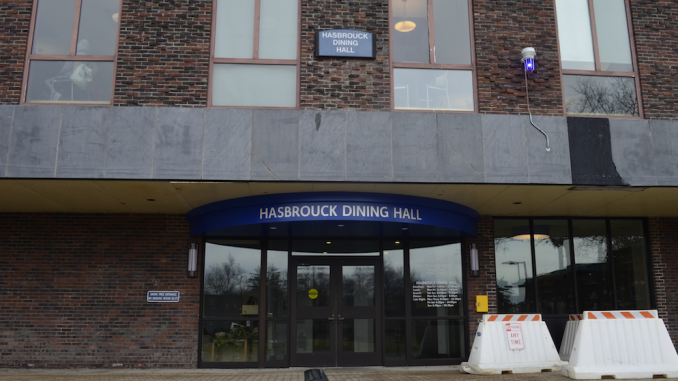
SUNY New Paltz held two open forums for community members to discuss their views on the association of the Hasbrouck complex building names with slave ownership.
The school’s Diversity and Inclusion Council hosted the event in hopes of opening a dialogue with community members about the issue of the building names. The council’s job is to gather information to advise the Board of Trustees, who make the final decision.
“Building names are symbolic,” said council member Reynolds Scott-Childress, “Symbols have power and stand for our values and practices.”
The council’s main goal is to determine if the building names are associated with specific individuals or entire families. The discussions were held on Thursday, Jan. 25 and the second on Friday, Jan. 26.
“The building names have been a topic of discussion at the College for a number of years. Some view these building names as perpetuating the legacy of slavery,” said college spokesperson Chrissie Williams. “The College is aware that some students, particularly students of color, have expressed their discomfort about living in halls with these names.”
The original Huguenot families are credited with settling the New Paltz area as well as saving SUNY New Paltz with donations. But what role did they play in the slavery era?
“When the Huguenots arrived in the Hudson River Valley in the 1660s, they entered a slave owning society,” said Kaitlin Gallucci, Director of Marketing and Communication for Historic Huguenot Street.
By 1790 there were 77 slave owners and 302 slaves whom made up 13 percent of the overall population. Slaves labored in farms, the mills, and households of New Paltz.
Joseph Zeleznik is a Poughkeepsie resident, SUNY New Paltz alumni and descendant of the Huguenot families, including Deyo and Lefevere, was a staunch critic. He, along with many, argued changing the names erases history instead of addressing it.”
“If you don’t be careful, history repeats itself, “ Zeleznik said, “It is easy to sit here in judgement because we didn’t live in that time.”
Others argued that criticizing only the Hasbrouck complex was unfair. One woman argued that if the school scrutinized Hasbrouck complex names, the other building names should be examined as well.
“If we are going to examine the Hasbrouck complex buildings, we should examine Parker Theatre,” she said, “The Parker family owned slaves and no one feels threatened in that building.”
The issue becomes more complicated knowing that many slaves took their former master’s name when they were freed. John Hasbrouck was a freed slave who is commonly believed to be the first black man to vote in New Paltz.
However, many people felt the dark history associated with the names overshadows the family’s history. One student compared using slave owners for building names to naming one after Adolf Hitler.
Students discussed how the increasing diversity on campus can be reflected in the representation of diversity on campus. Living in a building named after a slave owner, they argue, does not respect diversity.
“If the students of the future and of the campus want change, then we should decide to change it. We need to move on,” said another student.
People discussed adding a hyphen next to the original name and place the name of a prominent slave alongside. Since the money donated to save SUNY New Paltz was generated through slave labor, slaves should receive credit as well.
The forum responded to a petition based on Change.org to rename Hasbrouck Dining Hall after Darold Thompson. Thompson was a beloved employee and alumni of SUNY New Paltz who died last year.
The debate over building names is emblematic of a larger debate over the function of civil-war era statues and symbols in America. Student activists have brought the issue of these mementos into the school’s narrative.
“The settlers’ descendants fought for the Union in the Civil War, became abolitionists and social reformers, were vital civil rights activists, and fought for America in World Wars. This does not excuse or erase New Paltz founders’ enslavement of Africans, but provides context for the legacy of the family names,” Galucci said.

